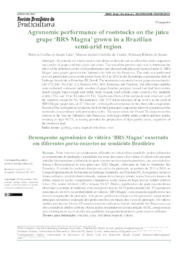Agronomic performance of rootstocks on the juice grape BRS Magna grown in a Brazilian semi-arid region.
Agronomic performance of rootstocks on the juice grape BRS Magna grown in a Brazilian semi-arid region.
Autoria: LEAO, P. C. de S.; CUNHA, M. A. C. da; SOUZA, E. R. de
Resumo: Rootstocks are widely used in viticulture worldwide and can affect the yield components and quality of grapes and their juices and wines. The aim of the present study was to determine the effect of the rootstock on the yield performance and physical and physical-chemical traits of ?BRS Magna? juice grapes grown in the Submédio do Vale do São Francisco. The study was performed over six production cycles in the period from 2015 to 2019 in the Bebedouro experimental field of Embrapa Semiárido in Petrolina, PE, Brazil. The treatments consisted of seven grapevine rootstocks: IAC 572, IAC 766, IAC 313, Paulsen 1103, SO4, Harmony, and Freedom. The following variables were evaluated: estimated yield, number of grape bunches per plant, branch and leaf fresh matter, bunch weight, bunch length and width, berry weight, total soluble solids content (SS), titratable acidity (TA), and SS to TA ratio (SS:TA). Significant effects of the rootstock were observed in all the variables except for SS. The rootstock ?IAC 572? led to increases of up to 61% in the yield of ?BRS Magna? grapevines, or 32.78 ton.ha-1, with significant responses in the other yield components. Results of the scatterplot in relation to the first three principal components allowed separation of the rootstocks in accordance with production cycles. The mean values for SS and TA characterize this cultivar in the Vale do Submédio São Francisco, with high soluble solids content and low acidity resulting in high SS:TA, as having potential for preparation of high quality juices, regardless of the rootstock used.
Ano de publicação: 2022
Tipo de publicação: Artigo de periódico
Unidade: Embrapa Semiárido
Palavras-chave: BRS Magna, Enxertia, Grafting (plants), Grapes, Porta Enxerto, Rootstocks, Scions, Uva, Videira, Vines, Viticultura tropical
Observações
1 - Por padrão são exibidas publicações dos últimos 20 anos. Para encontrar publicações mais antigas, configure o filtro ano de publicação, colocando o ano a partir do qual você deseja encontrar publicações. O filtro está na coluna da esquerda na busca acima.
2 - Para ler algumas publicações da Embrapa (apenas as que estão em formato ePub), é necessário ter, no celular ou computador, um desses softwares gratuitos. Sistemas Android: Google Play Livros; IOS: iBooks; Windows e Linux: software Calibre.
Acesse outras publicações
Acesse a Base de Dados da Pesquisa Agropecuária (BDPA) para consultar o acervo completo das bibliotecas da Embrapa.

